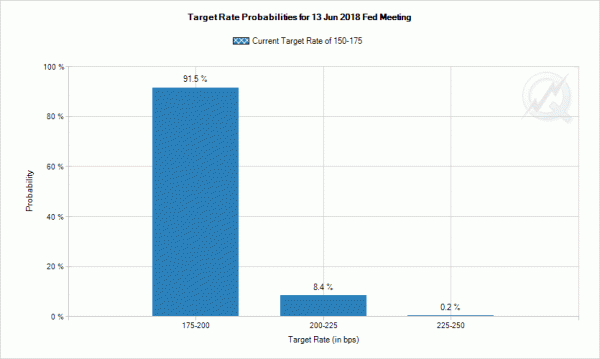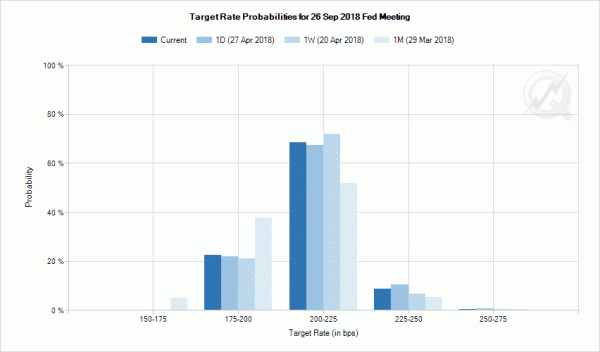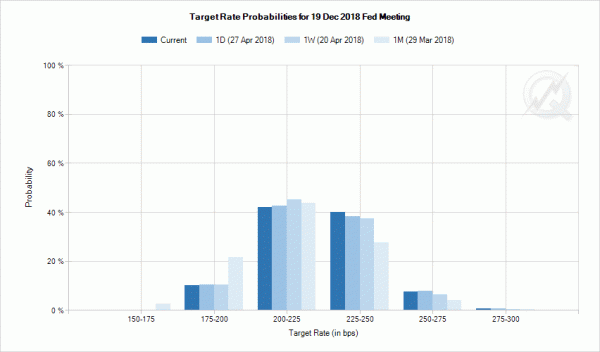Investing.com’s stocks of the week
The forex market open the week rather steadily with major indices stuck inside Friday’s range. Aussie is generally lower followed by Yen. Meanwhile, Sterling, Dollar and Swiss Franc are generally higher. But the picture could quickly change as volatility comes in. The week ahead is full of important events including RBA rate decision on Tuesday and FOMC announcement of Wednesday. But economic data will catch more attentions, starting with Germany CPI and US PCE today.
US steel tariff temporary exemptions to end on May 1
The temporary exemptions on US steel and aluminum tariffs will expire tomorrow on May 1. There is little progress made on trade negotiation between the US and other countries. Commerce Secretary Wilbur Ross was quoted saying that some countries will have their exemptions extended, but not all. But there is no more information from the White House regarding the pressing issue.
So far, only South Korea is granted permanent exemptions after revising the bilateral free trade agreements with the US. There, South Korea agreed to a quota of around 2.7 million tons of steel exports to the US. And, the quota for US car imports was doubled to 50,000, without the requirement to meet local safety standards.
NAFTA negotiations made some progress last week after intensive work, but it’s not ready to be wrapped up before May 1 target. Talks will instead resume on May 7 after US Trade Representative Robert Lighthizer returns from his China trip. It’s believed that Canada and Mexico will have their exemptions extended but it’s only confirmed when it’s announced.
Canadian Foreign Minister Chrystia Freeland reiterated her stance that NAFTA is a “completely separate track” from the steel tariffs. And, “there is no justification whatsoever for tariffs or quotas on Canadian steel or aluminum as a national security consideration.” Mexican Economy Minister Ildefonso Guajardo warned of retaliation and said “ambassador Lighthizer knows very clearly our position and how we have to react if any measure is imposed on Mexico.” It’s reported that Mexico already has a list of American products that it would tax in retaliation.
German Chancellor Angela Merkel also warned of retaliation. She issued a statement after dialogue with French President Emmanuel Macron and UK Prime Minister Theresa May. Merkel said the three leaders “agreed that the U.S. ought not to take any trade measures against the European Union,” which is “resolved to defend its interests within the multilateral trade framework.”
This topic will make some headlines in the early part of the week.
Updates on Fed funds futures pricings ahead of FOMC
Fed is widely expected to keep federal funds rate unchanged at 1.50-1.75% this week. But the tightening path will continue with another hike in June, to 1.75-2.00%. Fed fund futures are pricing in 100% chance of that. Markets will look into FOMC statement to confirm such expectations, but they actually don’t really need it.
The expectation for another hike in September also grew notably this week. Fed fund futures are pricing in 77.5% chance of a hike to 2.00-2.25%. That’s up from prior month’s 57%.
One more in December? The markets are unsure. Expectations did grew but Fed fund futures are still pricing in less than 50% chance of one more hike to 2.25-2.50% in December.
RBA to stand pat and lower GDP growth forecast this week
RBA is going to announce rate decision again tomorrow. And, it’s widely expected the it would keep the cash rate unchanged at 1.50%, and maintain a neutral stance. The message has been delivered repeatedly, while the next move is a hike, there is no pressing need to act in the near term.
The more interest part could be the new economic forecasts. Back in February, RBA projected GDP to grow 3.25% in both 2018 and 2019. And, they were above the government’s forecasts released back in December. The government projected growth to be at 3.0% in fiscal 2018/19 and fiscal 2019/20. There are some expectations for RBA to lower 2018 growth forecast this week, while the government may raise it as it delivers the May Budget.
Also, RBA projected underlying inflation (in February) to hit 1.75% in 2018 and 2.00% in 2019. But there is sofar no sign of any up trend in inflation yet. It’s more likely for RBA to keep inflation projections unchanged.
China official PMI manufacturing at 51.4, PMI non-manufacturing at 54.8 in April
The official China manufacturing PMI dropped 0.1 to 51.4 in April, slightly above expectation of 51.3. Non-manufacturing PMI rose 0.2 to 54.8, above expectation of 54.5.
In its quick China Data Response note, Capital Economics noted that “the official manufacturing PMI points to economic conditions having remained healthy in April. However, it warned of ” headwinds from the property sector and slower credit growth building.” Additionally, it’s also noted that the official PMIs have history of providing “false signals” in the past.
Instead, the Caixin manufacturing PMI to be released on Wednesday “tends to be better correlated with cyclical trends in the sector and will give us a better idea of how the economy has performed recently”.
A week full of market moving data
The week ahead will be extremely busy. In addition to FOMC and RBA meeting, there are a number of heavy weight economic data featured. From US, there will be inflation data from personal income and spending, ISM indices and non-farm payrolls. Eurozone will release Q1 GDP as well as April inflation. UK will release PMIs. Australia will release trade balance while New Zealand will release employment. All these data could be market moving. Here are some highlights for the week ahead:
- Monday: German retail sales, CPI; Swiss KOF; Eurozone M3; Canada IPPI and RMPI; US personal income and spending, Chicago PMI, pending home sales
- Tuesday: RBA rate decision; UK PMI manufacturing, M4, mortgage approvals; Canada GDP, manufacturing PMI; US ISM manufacturing, construction spending
- Wednesday: New Zealand employment; Japan monetary base, consumer confidence; China Caixin PMI manufacturing; Swiss SECO consumer climate, retail sales; Eurozone PMI manufacturing revision, GDP, unemployment rates; UK construction PMI; US ADP employment, FOMC rate decision
- Thursday: Australia trade balance, building approvals; UK services PMIs; Eurozone CPI flash, PPI; Canada trade balance; US non-farm productivity, jobless claims, trade balance, ISM non-manufacturing, factory orders
- Friday: Eurozone PMI services revision, retail sales; US non-farm payrolls.



